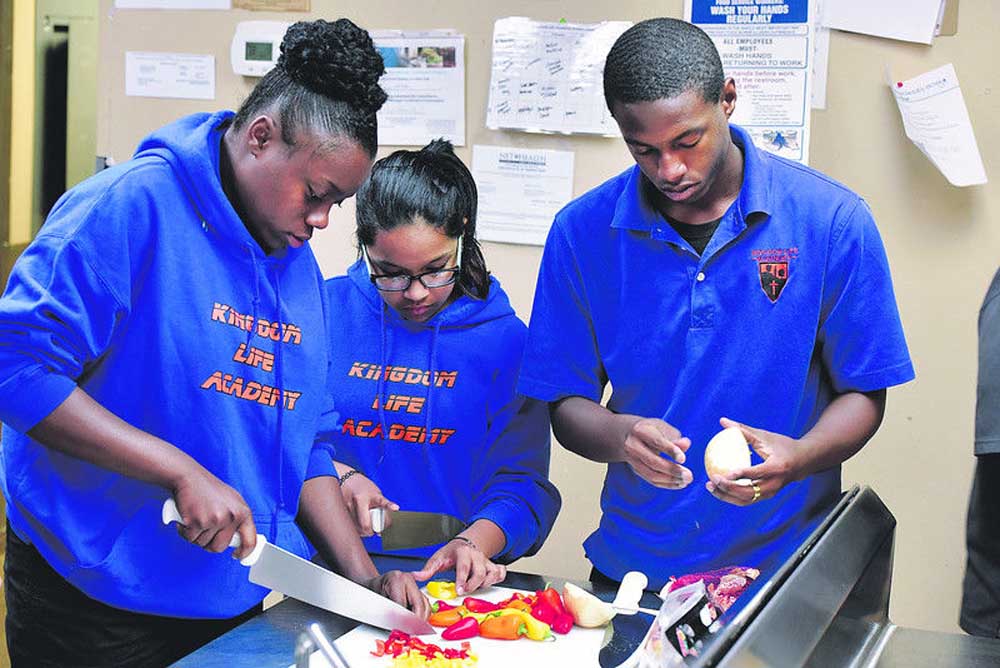Kingdom Life Academy and leader Joel Enge offer path to success
Published 6:30 pm Sunday, May 22, 2016

- Kingdom Life Academy students Ke'Novia Jimerson, left, Selene Chavez, 14, and Antoine Neal, 18, chop vegetables for their lunch on Monday, April 25, 2016, in the kitchen at Colonial Hills Baptist Church in Tyler. All the students at the small faith-based school have received their food handling permits and, as a group, prepare the meals and snacks for themselves and staff as part of their regular daily curriculum. Andrew D. Brosig/Tyler Morning Telegraph)
Inside the commercial kitchen at Colonial Hills Baptist Church, students from Tyler’s Kingdom Life Academy are receiving their lesson for the day.
JaQuan McKenzie and Lauren Thompson cut through raw chicken, while Christian Espitia stirs it in a sizzling frying pan until it’s cooked through.
Across the room, three students slice onions and an array of colorful peppers, while two others prepare snacks all under the watchful eye of teacher Samantha Strout.
The kitchen and all that comes with it – the need for cooperation, communication and cleanliness – is a familiar learning environment for these students. In fact, it’s part of their school day.
Four days a week, they spend more than an hour here, preparing their meals, predominantly from scratch.
Each week the students sit as a group, peruse grocery store ads to see the prices and create a menu. They know their budget, and they have to stay within that budget.
They plan for breakfast, lunch and two snacks per day, and on Fridays, the class goes shopping.
“School should be about life and so life is (the) real world,” Kingdom Life Academy founder and director Joel Enge said.
This mindset has shaped Enge’s approach as an educator for many years, and it is one of the foundational elements of this nonprofit, Christian school Enge started in 2013 with support from his fellow church members at Colonial Hills Baptist and community leaders.
As a public school teacher for more than 15 years, Enge, 51, saw the challenges many students faced when they did not fit the mold of the traditional school system.
“I was seeing so many people, particularly young men, drop out in their hearts,” Enge said.
These students were intelligent, but not in a pencil and paper kind of way. They struggled to pass state-mandated standardized tests, and they didn’t see how what they were learning in class connected to the real world. Year after year of failing in the same educational system had defeated them.
“We’ve got to reach them,” Enge said. “They need something different. They need the real life experience because much of the tradition is a disconnect from their real life.”
It was in part because of this need that Enge started an afterschool group for boys called Men of Issachar while still teaching at Boulter Middle School in Tyler.
The purpose of the student-led organization was to address the masculine heart of young men.
Students did outdoor activities, studied the Bible, prayed and built things with their hands. They also went on two out-of-state mission trips in the summers.
In 2011, two years after launching Men of Issachar, Enge sensed the Lord telling him to start a school. Not just any school, though, but a school geared toward these students who were failing in the traditional system. A school for students who were not set on attending a four-year college or university, but more interested in getting out of high school and getting on with their lives. Still, with a call from God in his heart, Enge wasn’t sure.
“I can’t,” he said of his thoughts at the time. “I don’t have the skill set. I’m just a school teacher,”
A friend told him about a man named Steve Dement, a local business owner and attorney who started The Brook Hill School in Bullard.
Enge sensed the Lord saying, “If I can do it with him, I can do it with you.”
So he started praying asking God for confirmation. And for the next two years, God did nothing but confirm.
“I didn’t want to do it, to be honest,” Enge said. “I was totally fearful.”
Enge said God gave him the faith to step out, and, “As I stepped, He provided.”
LIFE-CHANGING
That walk of faith on Enge’s part has been a life-changer for several of the students who call Kingdom Life their school home. Many of these students have come to the school because of connections with Enge through Boulter, church or other parts of the community.
Take JaQuan McKenzie for example. McKenzie, 17, a junior, was one of the pioneer Kingdom Life Academy students who came the first year.
By McKenzie’s own admission, he entered middle school a rebellious young man. He frequently got in trouble and cared very little about people.
Starting when he was 10, McKenzie pretty much took care of himself. So, he forged his own path and became interested in drugs and alcohol.
About the only person McKenzie listened to at the time was his grandmother, and she told him about Enge’s Men of Issachar group at Boulter.
McKenzie joined and found a new way to live, a new purpose for his life. In the eighth grade, he committed his life to Jesus Christ.
“Now I actually have a heart for other people,” he said.
Enge said McKenzie has grown into one of his strongest leaders at Kingdom Life Academy.
McKenzie played a big part in securing the donation of mulch and compost for the academy’s community garden on Garden Valley Road.
While a junior at Kingdom Life, he is in his second semester studying heating, air conditioning and refrigeration technology at Tyler Junior College and ultimately wants to work as an air-conditioning tech and in construction. He said he likes working with his hands.
During his three years at Kingdom Life Academy, McKenzie said he has improved his reading and writing abilities and built an extended family.
“I would say he’s a father figure,” McKenzie said of Enge. “I would say he is more of a father than a teacher or a principal.”
Christian Espitia, 17, of Gresham has found his niche at Kingdom Life as well. Espitia also met Enge through the Men of Issachar program and said he wanted to attend the school from the moment he heard about it.
He said the school’s small class sizes make him feel more comfortable raising his hand and asking questions when he doesn’t understand something.
At his previous school, he didn’t want to raise his hand for fear his classmates would make fun of him.
Espitia is in his second semester studying automotive technology at TJC while attending his Kingdom Life classes. Enrollment in a TJC program is not required of Kingdom Life students, but it is highly encouraged.
Once Espitia is finished with high school, he would like to get experience in the automotive industry and open his own performance auto shop.
Espitia described Enge as a father figure of sorts.
“He’s been there 100 percent for me,” Espitia said. “He’s taught me how to become a man of God.”
THE PROGRAM
Because the school is nontraditional, almost everything about Kingdom Life Academy is project-based. Students do not take traditional classes in English, history or math.
Each student’s day is arranged based on their individual needs, particularly as it relates to reading and writing.
Students who are below grade level in reading and writing receive instruction in those areas to get them on grade level or above.
Students who are on grade level or above focus on their projects. Three primary projects consume most of students’ time: food service, the community garden and managing mock companies.
Through the food service class, students have weekly and daily routines related to creating their school menu, shopping, cooking and creating a cookbook.
The community garden project has involved on-site work planting and tending the fruits and vegetables and designing and building a welcome center. It also involved creating information packets about the garden and presenting that information to potential business partners in the community.
Students have written letters to community members requesting donations for the garden and met with city employees to get the necessary permits to build the welcome center.
In the financial literacy course, students manage mock companies and learn about fixed and variable expenses.
“They need the real-life reading, the real-life writing, the real-life math that’s going to prepare them to move out of the educational system … to be confident,” Enge said.
Next year, the school plans to introduce a government class for seniors. Another possible future course is auto maintenance.
In addition to the core academic components of the program, there is a large community service component.
Students have repaired wheelchair ramps, cleaned up the property at abandoned businesses and helped senior citizens and disabled people with yard work and other home projects.
When it comes to finances, the school operates on a $130,000 annual budget with revenue coming from tuition, individual donations, church donations and grants from local foundations.
Enge said donations totaled about $200,000 for the past three years combined.
The first year all four students attended the school for free. The school met in a family’s house and Enge lived off of a monthly check provided by a family at his church as well as some of his personal savings.
After that, donations started coming in and, the second year, families started paying tuition.
All eight students today receive some amount of scholarship assistance and the most any family pays is half of the $5,000 per year tuition.
Enge said his plan for next year is to move to a more formal sliding tuition scale with all families paying at least something, even if it is just $10 a month.
WHAT’S NEXT?
Looking toward the future, Enge is planning for growth. Today, the school has eight students, four boys and four girls in eighth through 11th grades. Enge said the lowest grade he would accept is sixth grade.
“Right now, we’re basically functioning as a one-room school house,” he said of the arrangement at Colonial Hills Baptist Church.
More than 23 acres have been donated to the school, and Enge said the plan is to begin construction on a 4,500-square-foot campus this year.
It has raised almost $100,000 of the $300,000 necessary to build the campus. But, the school also applied to a contest to win a free steel building from Mueller Inc. They will find out July 1 if they won.
The school is not accredited and though that could be on the radar at some point, it’s not something the school is seeking now.
Enge said while there are many positive aspects of accountability that come with accreditation, he wants the freedom to be able to create the educational program that meets the needs of the students.
That might not be possible under the requirements of certain accrediting agencies. An eight-member board of directors does oversee the school.
Though some people might think these students are missing out on something by attending this nontraditional program, Enge said, on the contrary, they are gaining more.
“Not only am I getting the education,” he said of the students, “but I’m getting the relationships with people who become assets and resources that I know I can go to if I’m lacking resources in a particular area.”
Twitter: @TMTEmily






